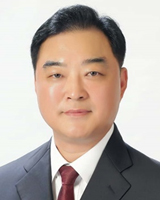
Keynote Speaker
How can governments better serve citizens in our connected world?Bill Banks
- Organization, Position : EY Asia Pacific Infrastructure Leader
- Curriculum Vitae
- 2018~Present: EY Asia Pacific Infrastructure Leader
- 2018~Present: EY Client Service Partner Rockefeller Foundation 100 Resilient Cities Initiative
- 2016: Member of B20 Infrastructure and Investment Taskforce
- Bill is the EY Asia Pacific Infrastructure Leader and has more than 25 years of experience in advising government clients on a range of complex, iconic infrastructure projects around the world. Bill has lead engagements on major Smart City Urban Development projects such as West Kowloon Arts and Cultural District and the Shenzhen Super Headquarters Project. He has led several cross-domain projects, including strategic planning, business case study, industry planning, operations management, financial forecasting and financing solutions for a number of public and private sector clients. Clients include: World Bank, Asian Development Bank, Asian Infrastructure Investment Bank, Australian Government and others.
This presentation will seek to demonstrate that Digital innovation, when approached with inclusiveness and responsibility, can lead to a more equitable and prosperous society for everyone.
I will outline the numerous benefits that Digital innovation by governments offers to citizens. Digital innovation by governments offers numerous benefits to citizens, enhancing public services, improving accessibility, and fostering transparency. It empowers citizens by providing them with easier access to information, services, and opportunities, leading to a more connected and efficient society.
Despite these advantages, digital innovation by governments also faces challenges related to inclusiveness. The presentation will explore these challenges and provide discussion on how best to address these through collaborative efforts between governments, technology companies, and citizens.
The outcome of the presentation will be to highlight that by working together, we can overcome the challenges and create an inclusive digital ecosystem that benefits all citizens, leaving no one behind in the digital age.

ModeratorSeong Woo Ji
- Organization, Position : Professor, Sungkyungkwan University Law School
- Curriculum Vitae
- ※ 2024, 30th President of the Korean Constitutional Law Association
- 2021~present: Director of External Relations Department at Sungkyunkwan University
- 2021~present: Directior of Foundation for Broadcast Culture
- 2020~2023: Commissioner of the Presidential Personal Information Protection Commis
- Professor Seong Woo Ji received his bachelor's and master's degrees from the School of Law at Sungkyunkwan University, and then, he received his PhD degree from University of Mannheim, Germany. He served as a research fellow at the Korea Broadcasting Commission, a commissioner of the Press Arbitration Commission, and a fund examiner at the Ministry of Information and Communication, and also took part as the Vice President of the Korean Public Law Association and the Korean Society for Media Law, Ethics and Policy Research, President of the Korean Political Communication Association, and a Commissioner of the Personal Information Protection. He is recognized as an expert in the field of ICT and media policy through various research and activities that he carried out at home and abroad, such as becoming the winner of the Chulwoo Media Law Award in 2019. He is currently a director of the Foundation for Broadcast Culture and the Director of External Relations Department at Sungkyunkwan University, and in 2024, he is planning to serve as the 30th President of the Korean Constitutional Law Association, to play a role in the contribution made by the constitution on the integration of citizens. Professor Seong Woo Ji is driving the successful operation of smart cities by proposing methods to respect privacy and rights of citizens while suggesting means to qualitatively improve and integrate information within the smart city through research on the quality of digital information such as fake news.